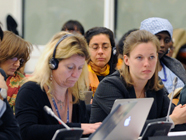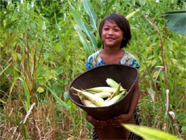
It has become something of a given that significant new national or international issues that are addressed by government must include a component of multi-stakeholder involvement. That multi-stakeholder model was invented at the United Nations’ 1992 ‘Earth Summit’ and formalized in Agenda 21. For Rio+20, Major Groups have been invited to present general policy inputs for the “zero draft” document.
The extent of the role that various stakeholders would play was not fully anticipated in 1992, when the idea of active participation by the independent sector first was reflected in a document at the United Nations Conference on Environment and Development. Agenda 21 – the Summit’s blueprint of action to achieve sustainable development – acknowledged and codified those stakeholder sectors as the “Major Groups”. Nine Groups were explicitly identified: Women, Children and Youth, Indigenous Peoples, Non- Governmental Organizations, Local Authorities, Workers and Trade Unions, Business and Industry, the Scientific and Technological community, and Farmers.
Major Groups included a vast number of non-governmental actors whose input was becoming increasingly critical in defining policies and mechanisms related to sustainable development issues.
Each major group was given its own chapter in Agenda 21 defining its role, areas of influence, obstacles and responsibilities in achieving sustainable social patterns. Those roles could involve being consumers of resources, producers, innovators, communicators or role models who could pioneer new techniques and motivate others to move towards more sustainable practices.
A social dimension
One of the most visionary aspects of Agenda 21 and the 1992 Summit was the premise that, in addition to the environmental and economic dimensions that needed to achieve integration, a social dimension also needed to be addressed. Without access to adequate clean water, energy, nutrition, education, individual rights and information or participation in local democratic decision making, people around the world would not be able to focus on the longer term requirements of a sustainable future.
The understanding was that enabling every single sector to take action would not only benefit itself, but benefit the broader society as well. And it could help build public constituencies in favor of sustainability-friendly policies and programs that could motivate political leaders to act as well. In general, the “Major Groups” approach has proven to be a functional and definitely useful example of wide-ranging civil society participation
Since 1992, these groups participated in each annual meeting of the UN Commission on Sustainable Development (CSD), and in subsequent Review processes, such as the 2002 World Summit on Sustainable Development in Johannesburg. They attend many types of intergovernmental meetings and have opportunities to speak at most plenary meetings. They hold consultations with bureau representatives on process, and with governments on substantive issues. They receive official documents and distribute their own. They organize side-events and build coalitions through meeting among themselves.
A growing stakeholder’s involvement
Over the past two decades, similar models of multistakeholder involvement have been adopted by various UN agencies and programmes, and by other intergovernmental processes, if in less intensive forms, such as the World Bank, the IMF and the G20. There has been a broad movement toward increased stakeholder participation that has taken place at the local, sub-national and global governance levels – not to mention the growth of stakeholder consultations with business and industry.
The Rio+20 process has continued the involvement of the Agenda 21 major groups, and in some ways expanded it. This past November, for the first time in a General Assembly Conference-level negotiation, the accredited major groups organizations were invited to present general policy inputs – at the same time as governments – to the planned Rio+20 ‘zero draft’ document. Nearly 500 organizations did so. And in February, the DESA Division of Sustainable Development accepted specific additional text comments to the emerging Conference draft document, and integrated them into an informal parallel document – brackets and all – so that interested governments could have easy access to those groups suggested positions.
Towards a Sustainable Development Council
Major groups generally hope that an acceptable way can be found to strengthen the UN Environment Programme (UNEP), and to start the process toward the establishment of a Sustainable Development Council that would maintain and hopefully upgrade the active participation that they had in the Commission on Sustainable Development.
On the ‘green economy in the context of poverty eradication and sustainable development’, there is a significant range of opinions and concerns among major group organizations. Many organizations expressed concerns that this new notion could ‘water down’ the unanimously agreed principles of sustainable development, in a way that could result in regarding natural resources merely as commodities, and would open the door to any business using ‘green’ terminology without meaning.
Most major groups will be trying to communicate to the public that a sustainable future is possible; that there are a large number of proven, effective programmes and technologies already at work; and that sustainable societies would provide affordable, achievable and attractive communities to live in.
Major groups all agree on one point: the success at Rio+20 is essential.
The author of this article, Michael Strauss, has been involved with media relations for Major Groups over the last two decades.
For more information: http://www.uncsd2012.org/rio20/majorgroups.html

